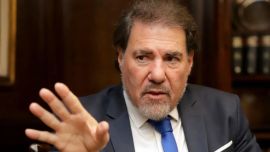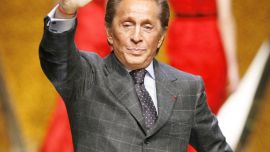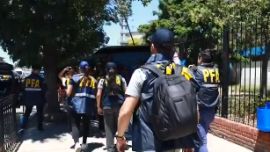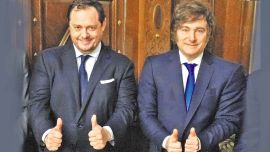Following his disastrous defeat in the 1982 South Atlantic War, that tin-pot dictator Leopoldo Galtieri sought to dodge his guilt by pointing out that the several hundred young Argentines slain in that conflict were far less than the several thousand citizens dying on the roads every year (a breathtakingly insensitive statement which had numerical accuracy on its side but little else). In this pandemic year that perverse logic could be carried a step further by pointing out that deaths on the road (3,138 in a lockdown-ridden 2020 and 6,627 in the more normal year of 2019) are but a fraction of the nigh 64,000 who will have died from Covid-19 in the last 13 months by the time this column is read, but no twisted mind has yet stepped forward to make that odious comparison – and far less the late Transport Minister Mario Meoni.
Other twisted minds could make hay of a transport minister of all people perishing in a traffic accident, but the circumstances of Meoni’s death only speak well of him as a human being – a devoted family man working late at the office and giving his chauffeur the night off, intent only on driving home for some quality time over the weekend.
Paying tribute to him as a good guy would be entirely in order but to say that the nation has lost a great minister would be pushing it. Potentially great maybe, but he was hamstrung at every turn. Meoni (56) was never a political heavyweight within a highly political Cabinet – the Renewal Front co-founder was a consolation prize tossed out to parliamentary Speaker Sergio Massa, very much the junior partner in the current ruling troika if a partner at all. Pre-Massa, the young Junín mayor was one of many “K Radicals” (recruited by then-Cabinet Chief Alberto Fernández rather than the presidential couple, and also abandoning Kirchnerism around the same time as Fernández).
As for his ministry, he entered the post without any team of his own, with scant technical credentials (little more than his father having been a Highways Board employee and Junín a major railway hub in the past century) and two hard acts to follow – Guillermo Dietrich (he of the low-cost “aviation revolution”) preceded by Florencio Randazzo, the Interior minister who was Cristina Fernández de Kirchner’s heir-apparent until he wasn’t, assigned the Transport Department with the mandate to modernise the railways following the 2012 Once station disaster along with a massive budget towards that end which he used to good effect. Hampered by debt overhang constraints in the first months, Meoni’s ministry was hit harder than most by the coronavirus pandemic when the country literally ground to a halt, an opportunity also seized to advance the dream of an Aerolíneas Argentinas monopoly. Almost Meoni’s only public intervention was to defend the closure of El Palomar low-cost airport – he argued that the volume of Buenos Aires air traffic did not justify three airports, which might well be valid for both past and present but could deny the future.
---
Meoni was not the first minister to die in office – newsroom memories stretch all the way back to the Raúl Alfonsín presidency which thus lost two successive Defence ministers in just nine months, first Raúl Borrás (51) to lung cancer in mid-1985 and then Roque Carranza (65) who suffered a heart attack in his swimming-pool in the summer of 1986, an end described by Alfonsín in the lofty rhetoric of those times as “dying in a heroic struggle for the fatherland.” The Subte station Ministro Carranza is named for the latter in tribute to his work towards expanding the City underground, the main footprint from his 1983-1985 stint as Public Works minister – as one of the tougher personalities in an often lame party (one of the few Radicals to attempt armed rebellion against the 1946-1955 Peronist régime), Alfonsín picked Carranza to replace Borrás in Defence at a tense period in civilian-military relationships (including the 1985 junta trials) but his heart evidently could not withstand the strain.
The late Carlos Menem also suffered a double whammy – in the first year of his 1989-1999 presidency. After only six days in office, Economy Minister Miguel Angel Roig (68, a Bunge & Born executive who smoked seven packs of cigarettes a day) suffered a fatal heart attack at the Bastille Day reception in the French Embassy while just two months later the Learjet of his Health and Welfare Minister Julio César Corzo (53, a veteran trade unionist) crashed into the Paraná River in Misiones, drowning him. I would qualify as a witness to Roig’s death as a guest at that French Embassy reception although I saw nothing – he actually died in the car rushing him to hospital.
No more ministerial deaths in the rest of the century or the next until now. The otherwise ill-fated Alliance administration of Fernándo de la Rúa was spared bad luck at that level – some of his ministers (Ricardo López Murphy, Hernán Lombardi and especially Patricia Bullrich) remain highly active to this day while Graciela Fernández Meijide is extremely vocal at the age of 90. Ditto for the 2002-2003 caretaker administration of Eduardo Duhalde (Roberto Lavagna in Economy and Ginés González García in Health). None of Néstor Kirchner’s ministers died in office (and only Defence Minister José Pampuro has died since, just three months ago). Cristina Fernández de Kirchner had no less than 32 ministers but while many people might describe her as a difficult boss, none of them died on her (only Foreign Minister Héctor Timerman and Agriculture Minister Carlos Casamiquela, a coronavirus victim seven months ago, have died since) although her husband did. Mauricio Macri also kept a clean sheet on this score.
Chronicles of deaths rarely foretold but none of them really changed anything – if the deaths of presidents in office (a total of three although a couple more were virtually on their deathbeds) have done little to alter the course of Argentine history with the striking exception of Juan Domingo Perón in 1974, how much less ministers. With all due respect to recently and not so recently departed ministers, I would round out John Donne’s famous line as “Death be not proud because you really have not had that much of an impact on Argentine politics.”


















Comments